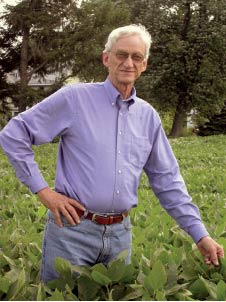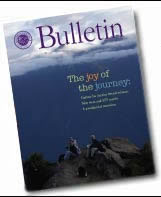Sharing rice and soybeans:
Alumnus cultivated collaboration to improve agricultural economies
By Landon Yoder ’04
 A
glance through Harold Kauffman’s passport would reveal
passages to Haiti, India, China, the Philippines, Zimbabwe, Colombia
and nearly a dozen other countries. Noting his
birthplace – he
grew up on a farm in West Liberty, Ohio – and
current Illinois
address, one begins to see how Kauffman has connected
his Midwest roots to his professional pursuits,
for the benefit of the
world.
A
glance through Harold Kauffman’s passport would reveal
passages to Haiti, India, China, the Philippines, Zimbabwe, Colombia
and nearly a dozen other countries. Noting his
birthplace – he
grew up on a farm in West Liberty, Ohio – and
current Illinois
address, one begins to see how Kauffman has connected
his Midwest roots to his professional pursuits,
for the benefit of the
world.
Kauffman, a plant pathologist and professor, has
spent much of his working life abroad, developing
ways to improve the world’s production of food and coordinating
agro- science exchanges between scientists intended
to help developing countries improve their
economic base. With animproved economy, developing countries
can afford to import crops, as well as export. Between 60 and
70 percent
of the population in developing countries is involved in agriculture,
as opposed to less than five percent in developed countries;
thus, improving the agriculture has a much larger impact on the
population.
This path began for Kauffman when his sister, Ruth (Kauffman)
Detweiler ’57,
convinced him to go to Goshen College, where he majored in biological
sciences. The late Frank Bishop, professor emeritus of biology,
was Kauffman’s primary professor as he focused on agriculture. “That
was really the strong foundation,” said Kauffman.
Kauffman graduated in 1961 and married classmate Jean Bachman,
who graduated with a degree in nursing. Jean’s connections
to a hospital in Haiti led to positions through Mennonite Central
Committee for both Harold and Jean.
“You could say it was an accident or one of those divine things
where God is leading,” Kauffman said. “It got us
started in the whole international arena.”
The couple worked at Albert Schweitzer Hospital in Des Chapelles,
where Kauffman engaged in agricultural and community development
projects that had a significant impact on his thoughts about
vocation.
Experience doing service in his vocational area, Kauffman said,
showed him that “by doing service I could help people, especially
through science and technology. People need food – you have
to look at the whole of life. You can’t just feed people
spiritually. You have to provide sustenance also.”
He also saw that there was gap between what they could provide
to the people they served and what was really needed to significantly
increase the quality of life for Haiti’s citizens.
"No matter how much effort you put into a country, it is not sustainable
if there isn’t a strong economic base and provide better
opportunities for jobs and food. So, I knew I needed to get more
training in a scientific area that would give me more expertise
to be able to help.”
After a three-year term in Haiti, Kauffman entered graduate school
at Michigan State University and completed a doctorate in plant
pathology in 1967. Ready to get back into the field, Kauffman
began work for the International Rice Research Institute (IRRI)
where
he was assigned to the All India Coordinated Rice Improvement
Project in Hyderabad, India. He describes this phase as “really
the most exciting part of my career.”
IRRI, based in the Philippines, was the four-year-old project
of the Rockefeller and Ford Foundations when Kauffman arrived. “There
were only 12 to 15 scientists when I joined,” Kauffman said. “Now
there are sister institutions developed in other major crops,
which has led to major increases in food production.”
Lead research at IRRI and collaborative projects across the globe,
combined with new opportunities in genetics, “basically doubled
rice production” during Kauffman’s work with rice
in India and also in China.
“To be able to make such a difference and improve the lives
of millions of farmers and consumers – because the cost
of rice was much less as the production of rice went up – was
probably the most significant part of my work,” said Kauffman.
Kauffman eventually moved from rice to soybeans. To advance the
production of soybeans, he sought to broaden the genetic base. “The
reason that is important is because as crops like rice or soybeans
evolved in nature, they tended to develop more diversity,” he
said. “Farmers tended to grow more diverse crops early
on, but as farmers became more commercialized crops tended to
become less diverse.” Broadening the genetic base helps
to protect crops against disease, insects and large fluctuations
in production.
Yet while international work to improve rice production was characterized
by efforts to share research, soybean farmers and researchers
demonstrated a different way of thinking about information sharing.
In the rice field “we had collaborative activities with
governments and scientists all over the world,” Kauffman
said. “I was very disappointed to see that the soybean
world didn’t operate that way.”
Kauffman headed the International Soybean Program at the University
of Illinois and sought ways to transplant the pattern of collaborative
work in rice into the soybean field. However, he faced criticism
for his ideas about international cooperation, both from soybean
farmers and from financial contributors.
“
The United States is the world’s biggest producer of soybeans,
and we don’t have to cooperate with anyone else,” said
Kauffman. “My attitude was that we should collaborate with
various countries.”
One means of broadening the genetic base of soybeans was to engage
the Chinese government and Chinese scientists. “Most of
the genetic diversity [in soybeans] is there; most of the soybean
germplasm – seeds collected from a plant’s site of
origin – came from China originally,” he said.
Kauffman took several university administrators and Midwestern
farmers with him to China to learn first-hand about the benefits
of cooperation and to exchange ideas with Chinese scientists.
Said Kauffman, “The Chinese agreed to exchange some soybean
germplasm, which they hadn’t done for 50 years because
of Communist rule.”
The Chinese provided 2,000 varieties of soybeans for study by
the International Soybean Program. According to Kauffman, the
exchange has helped U.S. farmers broaden the genetic base of
soybeans, while also producing a “modest yield advantage
when combined with U.S. varieties.”
While Kauffman enjoyed numerous successes as the result of his
work as the director of INTSOY, he continues to consider what
else might have been accomplished. “Quite honestly, the
work I was able to do in soybeans was much less than it could
have been if we had understood the benefits of soybeans being
used around the world,” said Kauffman. “My argument
was if we increased markets we would increase benefits to small
farms and developing countries. If developing countries don’t
have a developed agriculture, they will not be able to import
many food crops,” he said.
Kauffman observed that the mind-set that prevents cooperation
in developing soybeans is parallel to that which perpetuates
disparity between the rich and poor – the attitude that “you
can help people to a point, but don’t let them become competitors,” he
said.
Unless developing countries are given the resources to develop
their economies to be on equal footing with the West, Kauffman
said, there will not be enough resources to go around. “Simply
put, we in the rich nations have to share more – and we’re
not willing to do that,” he said.
In 1996 Kauffman entered the classroom as a professor in the
department of crop sciences at the University of Illinois, where
he has translated his professional experiences into lecture notes.
He began a course, The Global Food Production Web, to help students
understand food production in other countries and how international
markets are related.
“
In the U.S., only three to five percent [of people] know a lot
about agriculture, and urban people know essentially nothing,” Kauffman
said.
Kauffman seeks to share his values with students and colleagues,
which are rooted in his Christian faith. “As Christians,
we have to share first of all. We not only have to share our
values, but we have to share economic opportunities,” he
said. “To think that we’re a special Christian country
is just counter to what I have observed in living and working
with friends around the world.”
His goal was to compose the class with half rural students and
half urban students, and organize the curriculum around a variety
of crops. “My main goal was to get everybody interested
in one or two components of the global food production web by
giving them the chance to choose something they were interested
in,” said Kauffman.
“I have a lot of faith in the future, because every student in that class
had a lot to offer me as I saw them get excited.”
This fall, article author Landon Yoder will begin an internship position through
Mennonite Voluntary Service with World Vision International in its United Nations
office, assisting in relating to WVI’s policy concerns to U.N. Ambassadors.
He will live at Menno House in Manhattan.
< 1 | 2 | 3 >



 A
glance through Harold Kauffman’s passport would reveal
passages to Haiti, India, China, the Philippines, Zimbabwe, Colombia
and nearly a dozen other countries. Noting his
birthplace – he
grew up on a farm in West Liberty, Ohio – and
current Illinois
address, one begins to see how Kauffman has connected
his Midwest roots to his professional pursuits,
for the benefit of the
world.
A
glance through Harold Kauffman’s passport would reveal
passages to Haiti, India, China, the Philippines, Zimbabwe, Colombia
and nearly a dozen other countries. Noting his
birthplace – he
grew up on a farm in West Liberty, Ohio – and
current Illinois
address, one begins to see how Kauffman has connected
his Midwest roots to his professional pursuits,
for the benefit of the
world.